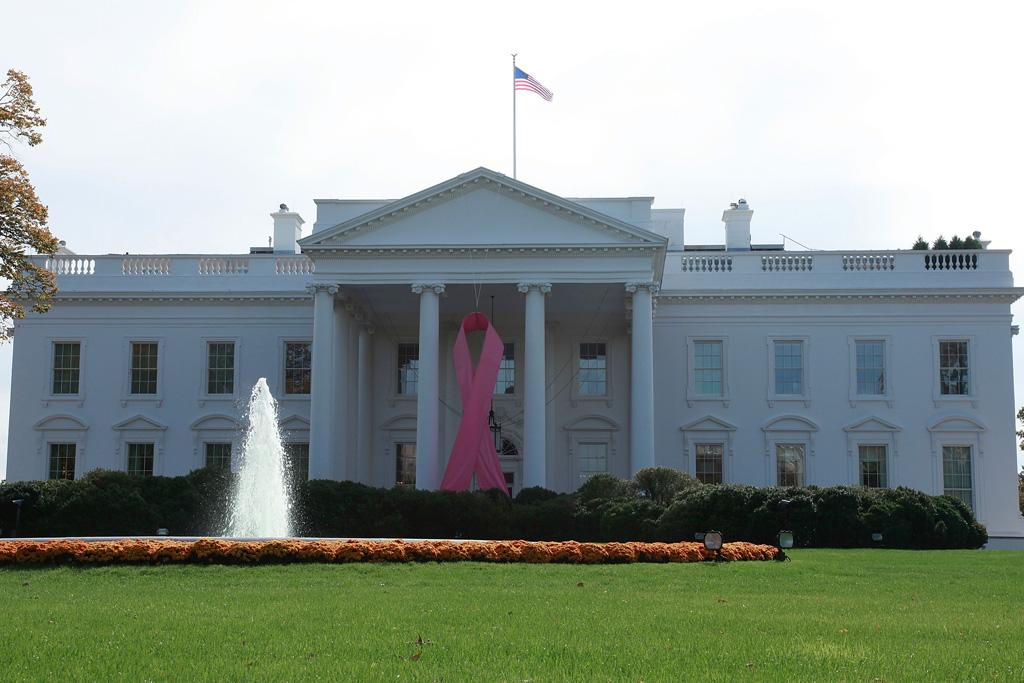Q&A: Cancer in the developing world
A large pink ribbon hangs from the North Portico of the White House on October 26, 2009 in Washington, DC. While the US has fought against cancer for decades, the disease’s new battleground, reports PRI, is the developing world.
This week, Public Radio International’s The World launched a special series called “Cancer’s New Battleground – the Developing World.”
The five-part series, reported by Joanne Silberner, explores cancer in Uganda, Haiti, and India, and looks at the challenges to fighting cancer that are unique to the developing world. Silberner is a freelance reporter and artist-in-residence at the University of Washington in Seattle, and she covered health issues for NPR for 18 years.
She spoke to GlobalPost about why she pursued this story and what she learned from her reporting.
Q: Why did you decide to report on cancer in the developing world?
A: I teach journalism part time at the University of Washington, and I noticed a flyer up on campus about a meeting about cancer in the developing world that was being held in Seattle. I looked at it and I thought, this is ridiculous. I’ve covered polio, neglected tropical diseases, and HIV in the developing world, and I thought, cancer? How could cancer possibly be a big deal? People don’t live long enough to get cancer, and you couldn’t deliver the therapy anyway.
So I figured, well, you know what, I’ll go down and I’ll hear what people have to say. And I went to the meeting and realized how incredibly wrong I was.
People do live long enough to get cancer, there’s a lot of pediatric cancer, and, in fact, there are more deaths from cancer [in the developing world] than if you added up the deaths from HIV, TB, and malaria, which astounded me.
The other thing I learned at the meeting was that there are lots of treatments that can be given with relatively low levels of care.
When I said to someone at the meeting, this is such an impossible thing, she looked at me and she said, that’s exactly what they said about HIV. They said HIV treatment couldn’t be done, and millions of people’s lives have been saved. So why can’t that happen with cancer?
So I figured, I better go find out what‘s really going on.
Q: What surprised you most in your reporting on this story?
A: Two things surprised me. One was the stigma against cancer. A couple of years ago I went to Uganda and reported on stigma and mental illness. And actually, surprisingly enough in Uganda, stigma against mental illness is not as high as you might think. So I‘ve been very interested in stigma against various diseases and how they block the treatment of those diseases. I was very surprised to find it with cancer. But there’s definitely a stigma, and people don’t admit it, they don’t want to admit it.
In the US, that is how things were 40 or 50 years ago. If you look in newspapers, in obituaries from 40 or 50 years ago, you see that people “died after a long illness.” That was cancer. But they didn’t even say that in the obituaries because the stigma was high. Now people go marching down the street wearing pink and carrying flags, but it wasn’t always like that.
So I was surprised to find that in developing countries. … It was sad to see. The stigma keeps people from coming in, it keeps local governments from supporting treatment efforts, and that may change, but that’s the way it is now.
The other thing that surprised me was that treatment can be done in developing countries. That was clear to me. It’s difficult, it needs a lot of thought and care, but it can be done.
Q: Why is it important to keep covering this story?
A: I think the only way to solve the world’s health problems, which are enormous, is through knowledge. The lack of knowledge by the American public about global health and global health initiatives is breathtaking.
When you ask people what percent of the federal budget goes to foreign aid — which isn’t just health, it’s all foreign aid — people say 20 or 25 percent. It’s less than one percent. We think we’re spending money that we’re not spending.
So when we’re seeing the world remain a pretty unhealthy place to be, we think, well, we spend all the money we can. But we haven’t spent that much.
And when you look at how health aid is given, a lot of it is ineffective because it’s given the wrong way. I’ve seen a lot of misspent health dollars. People run away from foreigners coming in and trying to give them shots or make them follow something, but when it’s done from a local level, when people on the ground are involved, it works much better. And I think if people in this country understand global health and global health issues, they will be more supportive of efforts, and they will also be more aware of which efforts work and which efforts don’t.
Our coverage reaches millions each week, but only a small fraction of listeners contribute to sustain our program. We still need 224 more people to donate $100 or $10/monthly to unlock our $67,000 match. Will you help us get there today?
